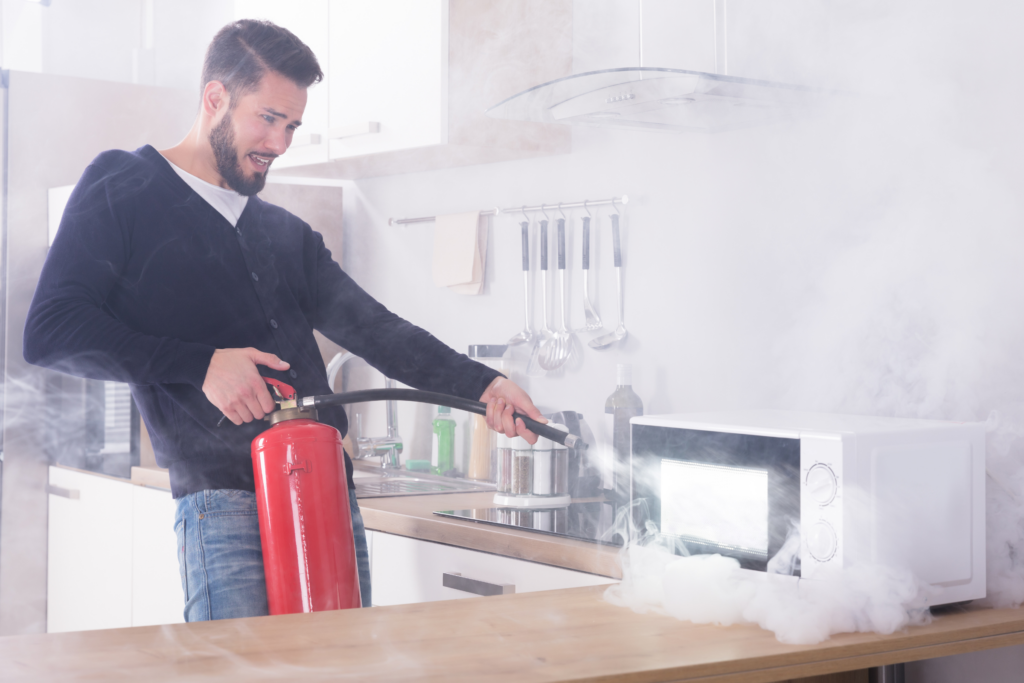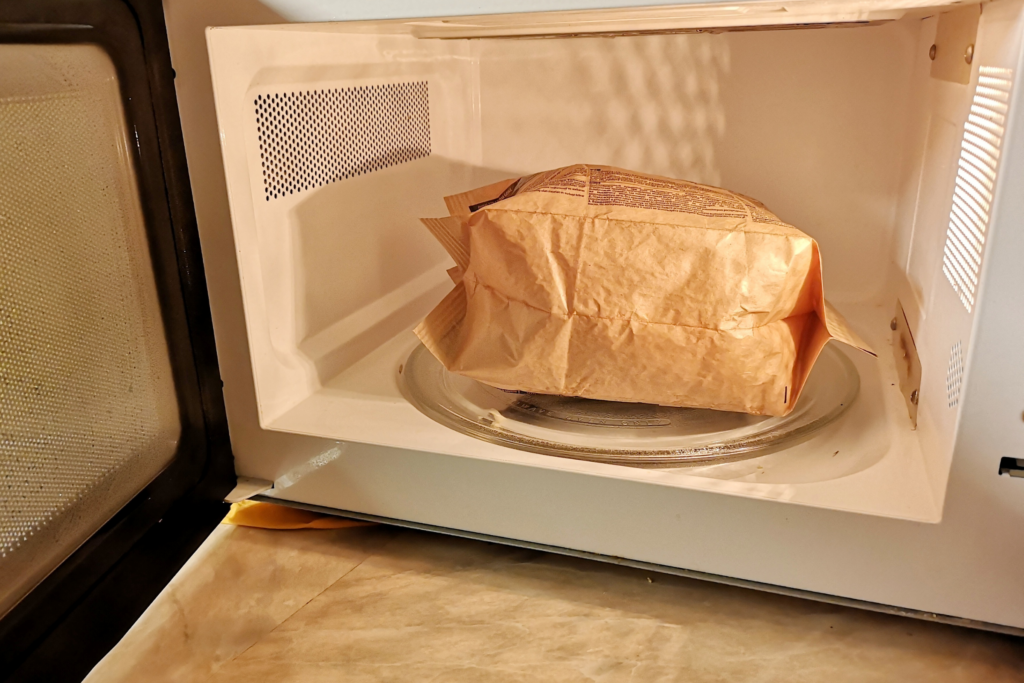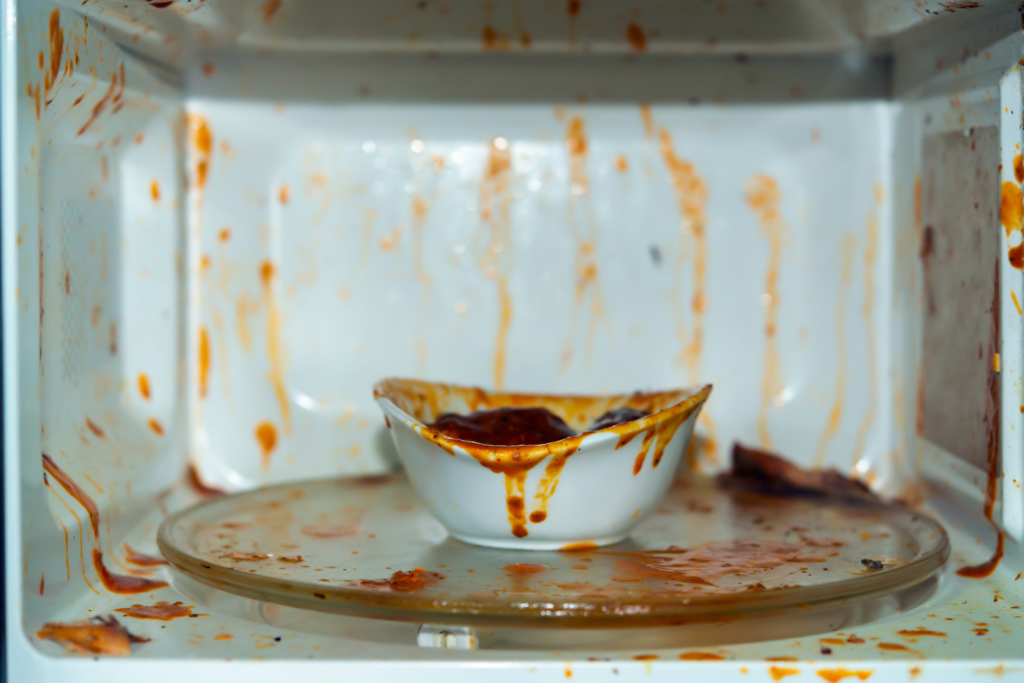Why Is My Microwave Burning Food Suddenly? (With 4 Simple Ways to Prevent it)
Did you accidentally burn the meal you’re preparing in the microwave? If so, you may be wondering why the microwave burns food and how you can prevent it.
The microwave may be burning your food due to cooking the food for too long, food packaging getting caught in the microwave, the microwave has developed hot spots, or heating food with too high of a power level.
Fortunately, the reasons why your food may be getting burnt are preventable. Even if you slip up and burn your food, we have a few tips and tricks to clean your microwave and neutralize that smoky odor.
Read on to find out why your meals may be getting burnt, how to prevent burning your food, and some simple cleaning tricks to get your microwave smelling good as new!
How do microwaves work?
Before you can understand the reasons behind burning food in the microwave, it helps to know how microwaves work.
Microwaves heat food through radiation. The radiation transmitted to the food creates vibrations in the molecules that subsequently heat up the food.
According to the FDA, microwaves literally produce micro-waves of energy that produce movement in food molecules.
Over time, the molecules produce heat from their rapid movement. This is how your food comes out hot after just a short minute!
4 Common Reasons Why the microwave burns food
Burning your food in the microwave isn’t uncommon. Let’s take a look at the likely culprits.
- Cooking your food for too long
- Food packaging is getting stuck in the microwave
- The power level is too high
- Your microwave has hotspots

Cooking times are longer than necessary
The first reason the microwave may be burning your food is because you’re heating your food for too long.
Any item that spends extended time in the microwave can dry out and catch fire, ruining your meal and the rest of your evening.
Food container or packaging is stuck and not able to rotate for even heating
Another reason your food could be getting burnt by the microwave is the food container or packaging.
When food packaging gets stuck in the microwave, the food cannot rotate and consequently overheats a particular area of the food.
A common example is heating up popcorn. If the packaging gets caught on the wall of the microwave, the bag is unable to rotate, and a particular spot is subjected to more heat than others.
In other words, the heat isn’t evenly distributed.

Using a higher power level than is recommended
The third and final culprit for the microwave burning your food is the power level.
Using a power level higher than what is recommended can burn your food.
Some items with microwave instructions recommend heating food on half power or something similar. This is because heating food on lower power at longer intervals should produce a more evenly-heated meal.
Failing to follow these directions can dry your food and burn it.
Your microwave has hotspots
What is a microwave hotspot, and why is it burning your food?
A microwave hotspot is an area of the microwave where it is hotter than normal. Hotspots overheat particular areas of your food, similar to what happens when the food packaging gets caught.
You may be wondering how you can combat this. Here are some tricks to avoid microwave hotspots:
- Marshmallow Method – fill a plate with mini marshmallows and see which ones brown first. Wherever the brown ones are located is where the hotspot is.
- Avoid placing your food in the newly-located hotspot.
- Use a different-shaped dish to avoid hotspots.
How to prevent burning your food in the microwave
Now that we’ve outlined the core reasons behind the microwave burning your food, here are some tips and tricks to avoid scorching your meal in the future.
- Use the recommended heating time – foods like vegetables generally need less time than other carbs or proteins. Check the state of your food as well; frozen food will need to be heated longer than room-temperature food.
- Use the recommended heating power – some foods should be heated on half power to heat more evenly than on full power.
- Check your food periodically – by checking it while it’s heating up, you can fix the packaging if it gets caught on the microwave at any point.
- Hydrate your food – many foods can benefit from adding a small amount of water or milk during heating. This prevents the food from drying out; this is good news for your taste buds and the probability of lighting your house on fire.
- Avoid certain foods prone to burning – things like peppers, eggs, and containers made of styrofoam are highly likely to burn or explode.
These common-sense tips can help you avoid turning your microwave into a smoke show that stinks up the whole house.
However, if your food is still burning after following these tips, you may wonder if using your microwave is safe.
Should you continue using a microwave that is burning food? Is it Safe?
Is it safe to use your microwave after burning food in it? It depends on the scenario.
If your food burned because you used the wrong time or power level, it is probably okay to continue using your microwave. If it’s a physical problem with the microwave, avoid using the microwave to heat your food until a qualified professional has looked at it.
Silly mistakes you made yourself can typically be dismissed. However, if burning your food is a recurrent issue, it may be more severe than how you heat your food.
In a scenario like this, we recommend heating your food up another way: in the oven or on the stove top.
Before using the microwave again, you should have a qualified professional look at it.
Concerns about microwave radiation safety problems
Aside from burning your food, a common concern with microwaves is radiation. Do microwaves pose a radiation risk?
Whether we should be concerned about radiation problems from microwaves is currently debated.
A 2017 study on the effects of microwave radiation on the brain provided conclusive evidence that microwave radiation is carcinogenic or cancer-causing.
However, there is not enough evidence to support that it is a relevant safety issue. Further studies must be done before a recommendation about microwave usage can be made.
How to clean the microwave after burning food (& eliminate odors)
Be mindful that the burnt smell might take several days to die out. That said, here are a few tips that can make a difference in how quickly the scent fades:
- Remove the burnt food from the microwave as soon as possible
- Open the microwave door for several hours
- Use an odor remover solution

Remove the burnt food from the microwave right away
Letting the food sit in the microwave is a recipe for disaster. The longer the burnt food is in the microwave, the longer the smell lingers.
Remove the food as soon as possible to avoid letting the smell of smoke sit.
Also, it’s imperative that you get all the burnt remains out of the microwave as soon as you can. Any missed remains will stink up the microwave the next time you use it.
Open the microwave door for several hours
After cleaning out all the burnt food, it’s important to open the door.
Keeping the microwave door open for hours is helpful because free-flowing air helps eliminate the burning odor.
Rather than trapping the burnt smell in the microwave, you should air it out.
However, consider leaving your home when you do this. It will smell for a bit!
Use an odor-remover solution
Any residual odor can be taken care of with a strong solution.
Using an odor remover solution can be the final step to eliminating bad odors.
Heat a solution of 6 tablespoons of baking soda or vinegar mixed with water in a microwave-safe dish for about 2 minutes. This helps to absorb all that remains of the odor.
Keep the microwave oven door closed for about 10 minutes while letting the solution stand still.
Why did my food burn in the microwave?
Your food may have burned in the microwave because you cooked it for too long, the packaging got stuck, or you used a higher power level than necessary.
What are the signs that a microwave is going bad?
Dysfunctional keypads, smoke, lots of noise, and improperly cooked food are all signs your microwave is going bad.
How can you prevent burns when microwave cooking?
Use the appropriate cook time and power. Be diligent in checking on your food and consider hydrating your food before heating.
Can burning food damage a microwave?
It is unlikely that burnt food will damage a microwave. However, if the food catches fire, it will destroy your microwave.
Recommended Posts
Let Us Know How We’re Doing!
Did this expertly prepared resource answer your question?
Do you have another question about home maintenance, home improvement projects, home appliance repair, or something else?
Get more information, send in questions and keep the discussion going by contacting the I’ll Just Fix It Myself company customer service team at at 1-800-928-1490 or Email us at [email protected]
